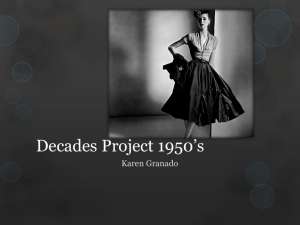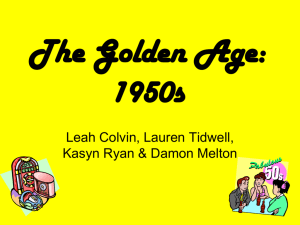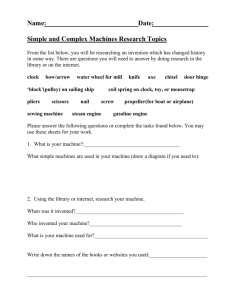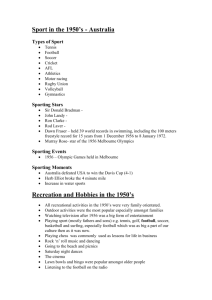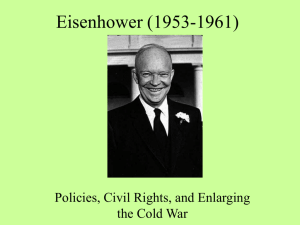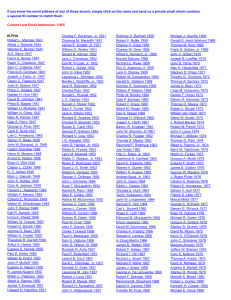1950s
advertisement
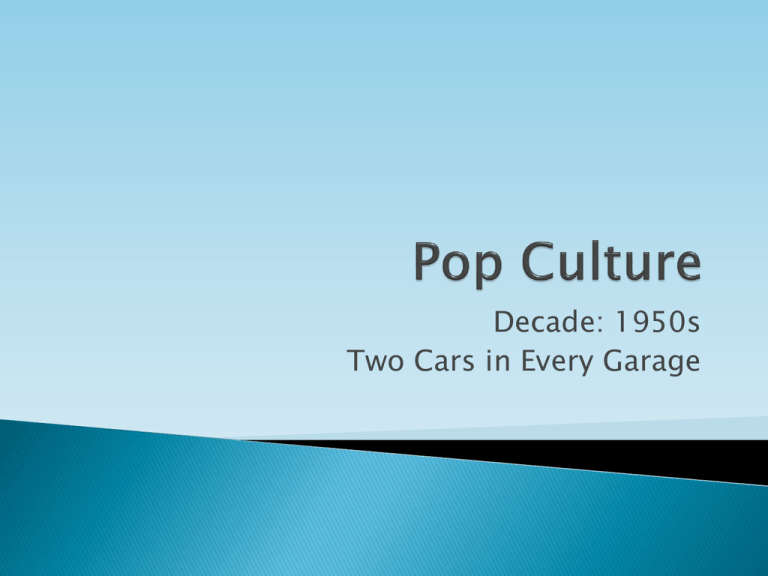
Decade: 1950s Two Cars in Every Garage 1950 ◦ For the first time, according to the 1950 census, the US has a population of over 150 million. ◦ Korean War begins when North Korean troops with Soviet backing invade South Korea. The war would last for 3 years. 1953 ◦ The Cold War continues when President Eisenhower approves a top secret document stating that the US nuclear arsenal must be expanded to combat the communist threat around the world. 1954 1955 ◦ Joseph McCarthy begins televised Senate hearings into alleged Communist influence in the United States Army. ◦ Racial segregation in public schools is declared unconstitutional by the US Supreme Court in Brown vs. Board of Education. ◦ The Supreme Court orders that all public schools be integrated with deliberate speed. ◦ Rosa Parks, an African-American seamstress, refuses to give up her seat on the bus to a white man, prompting a boycott that would lead to the declaration that bus segregation laws were unconstitutional by a federal court. 1956 1957 1959 ◦ Federal-Aid Highway Act is passed. The interstate highway system would enable quick and efficient travel for business and leisure travelers. ◦ President Eisenhower is reelected to a second term. ◦ National Guard is called to duty by Arkansas Governor Orval Faubus to bar nine black students from attending a previously all-white Central High School in Little Rock. The students would eventually be admitted to class. ◦ Alaska is admitted to the US as the 49th state. Hawaii would also be admitted to the union as the 50th state. 1950 1951 1952 ◦ Peanuts, the comic strip written and drawn by Charles Schultz, debuts in seven US newspapers. ◦ I Love Lucy, starring Lucille Ball, premieres on CBS. ◦ Gunsmoke debuts as a radio drama. Three years later it would move to the TV where it lasts until 1975. ◦ American Bandstand, a popular teen-oriented music program, debuts as a local show in Philadelphia. Dick Clark, its most famous host, comes aboard in 1956. ◦ The Today Show debuts on NBC. 1954 ◦ “That’s All Right, Mama” and “Blue Moon of Kentucky,” by Elvis are released on Sun Records. ◦ The Tonight Show debuts on NBC. 1955 1957 ◦ The $64,000 Question debuts and soon becomes the most popular game show of the 1950s. ◦ The landmark musical West Side Story, a modern-day adaption of Romeo and Juliet opens on Broadway. 1956 ◦ Dan Larsen pitches the first no-hitter, a perfect game, in post-season baseball history when his New York Yankees beat the Brooklyn Dodgers in the 5th game of the 1956 World Series. 1959 ◦ The Daytona 500 stock car race is run for the first time, with Lee Petty taking the first checkered flag. 1950 1951 1952 ◦ 1st credit card issued (Diner’s Club) ◦ ◦ ◦ ◦ Super glue invented Power steering invented First video tape recorder Color TV introduced ◦ Seat belts introduced ◦ Polio vaccine created by Jonas Salk ◦ Mr. Potato Head patented ◦ First diet soft drink sold 1953 ◦ Black box flight recorder invented ◦ DNA discovered ◦ 1st Playboy magazine produced (Marilyn Monroe) 1954 ◦ Large scale vaccination of children against polio begins in Pennsylvania. ◦ The “pill” is invented. ◦ Report says cigarettes cause cancer 1957 ◦ Gordon Gould, an American physicist, invents the laser. He would not win patent rights until 1977. 1958 ◦ LEGOs first introduced 1959 ◦ Pacemaker invented ◦ Barbie Doll invented 1950 ◦ The Brinks robbery in Boston occurs when 11 masked bandits steal $2.8 million from an armored car outside their office. It was believed the Rosenbergs passed information about the atomic bomb to the Soviet Union. 1951 ◦ Julius and Ethel Rosenberg were found guilty of conspiracy of wartime espionage and sentenced to death. They would be executed in 1953. ◦ The inauguration of transcontinental television occurs with the broadcast of President Truman’s speech at the Japanese Peace Treaty Conference in San Francisco. 1952 1953 1954 ◦ Winter Olympics open in Helsinki, Finland with 30 participating nations. During these games, the first triple jump in figure skating history is performed by Dick Button, who won one of the four gold medals gained by the US athletes. ◦ The first hydrogen bomb, named Mike, is detonated on the Eniwetok Atoll. ◦ Panty raids on college campuses ◦ The first color televisions go on sale. ◦ Rosenbergs executed for espionage ◦ Ray Kroc founds the idea for the McDonald’s corporation. He opens his first franchise the following year. 1955 1956 1957 ◦ Disneyland opens in Anaheim, CA. ◦ James Dean dies in car accident ◦ Emmett Till brutally murdered in Mississippi for supposedly flirting with a white woman. ◦ The first transatlantic telephone cable began operation. ◦ Elvis gyrates on Ed Sullivan show ◦ The FBI arrests labor leader Jimmy Hoffa under a bribery charge. ◦ Sputnik launched by Soviets ◦ The first attempt by the US to launch a satellite into space fails when it explodes on the launchpad. 1958 ◦ Explorer I, the first US space satellite, is launched at Cape Canaveral. ◦ NASA founded ◦ The first major world’s fair since the end of WWII opens in Brussels, Belgium. Over 41 million visitors attended the event. ◦ An Alaskan earthquake occurs at Lituya Bay. It registered 7.5 on the Richter scale, producing a landslide that caused a mega-tsunami. Only two people were killed in the incident. 1959 ◦ NASA selects the first seven military pilots to become the first astronauts in the US. They were known as the Mercury Seven. ◦ A plane crash kills rock and roll legends Buddy Holly, Richie Valens, and the Big Bopper (J.P. Richardson). During the 1950s, people were beginning to feel a little more freedom when it came to their fashion choices. No longer did they feel like they had to conform to a certain look for certain situations. Women: the waistline was a major issue. Some women really liked the snug fit of the Dior dresses while others liked dresses with no waistline, often referred to as “sack dresses.” This decade was known for the “wondering waistline” in women’s fashion. Poodle skirts were popular during this time. Men: the fashion trendsetter, of course, was Elvis Presley, as Rock and Roll entered mainstream. Not surprisingly, the 1950s welcomed the youth movement in fashion that echoed a more rebellious look – greaser look. Made in the shade – something or someone that was guaranteed to be or is a success Peepers – glasses Split – to leave, very quickly Threads – clothing Burn rubber – to accelerate a car quickly Hot rod – American muscle car modified with large engines No sweat – something that was no problem or easy Pad – someone’s home Greaser – rebellious teenage boy, usually with tons of hair product in his hair Heat – police Ankle-biter – young child who was often found crawling around on the floor
